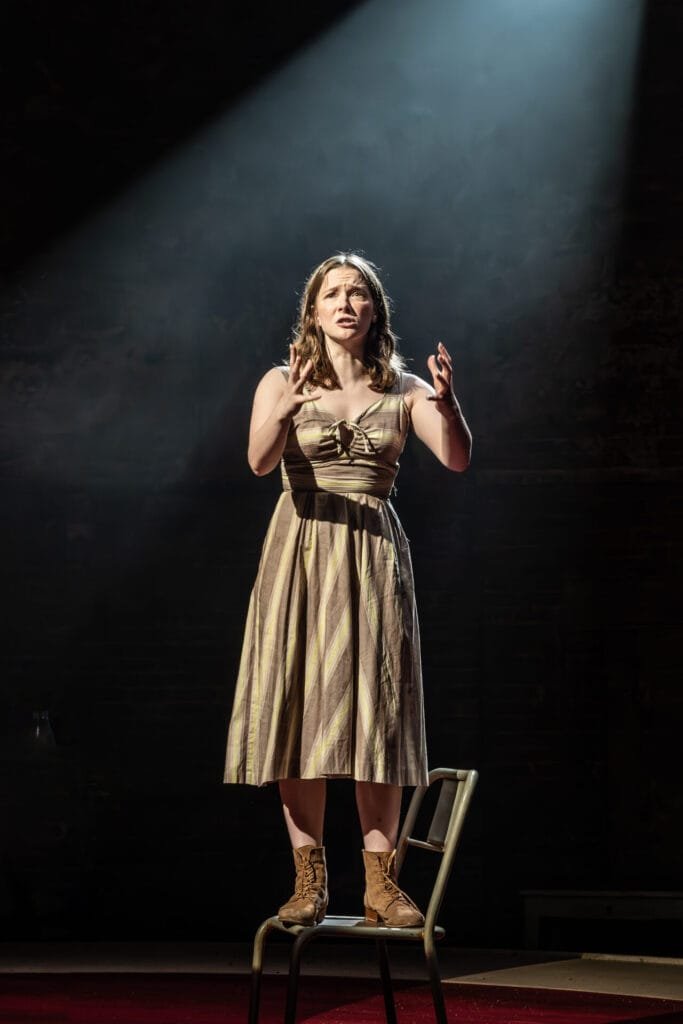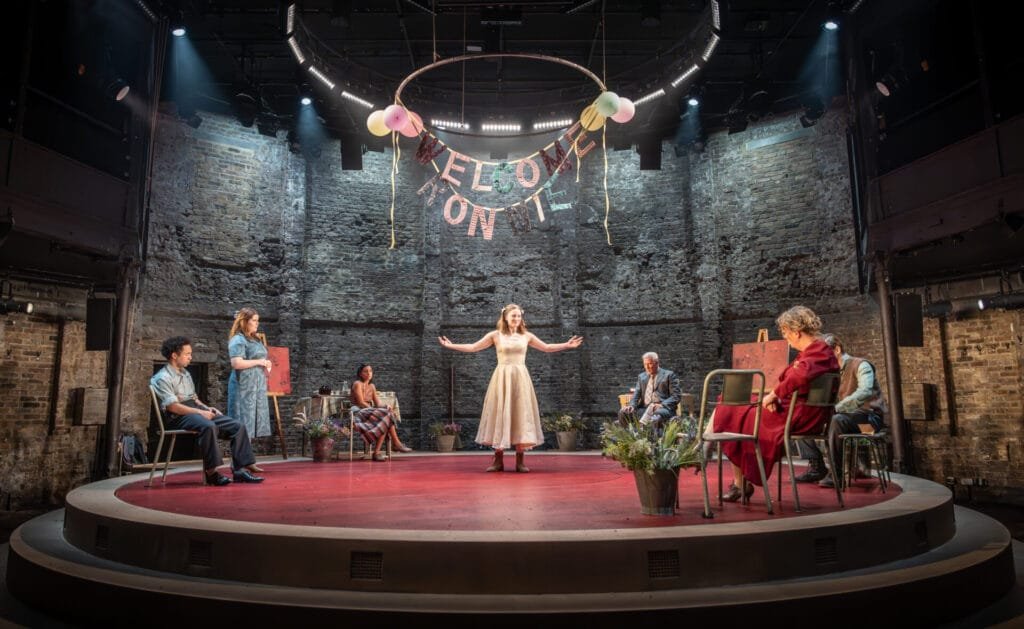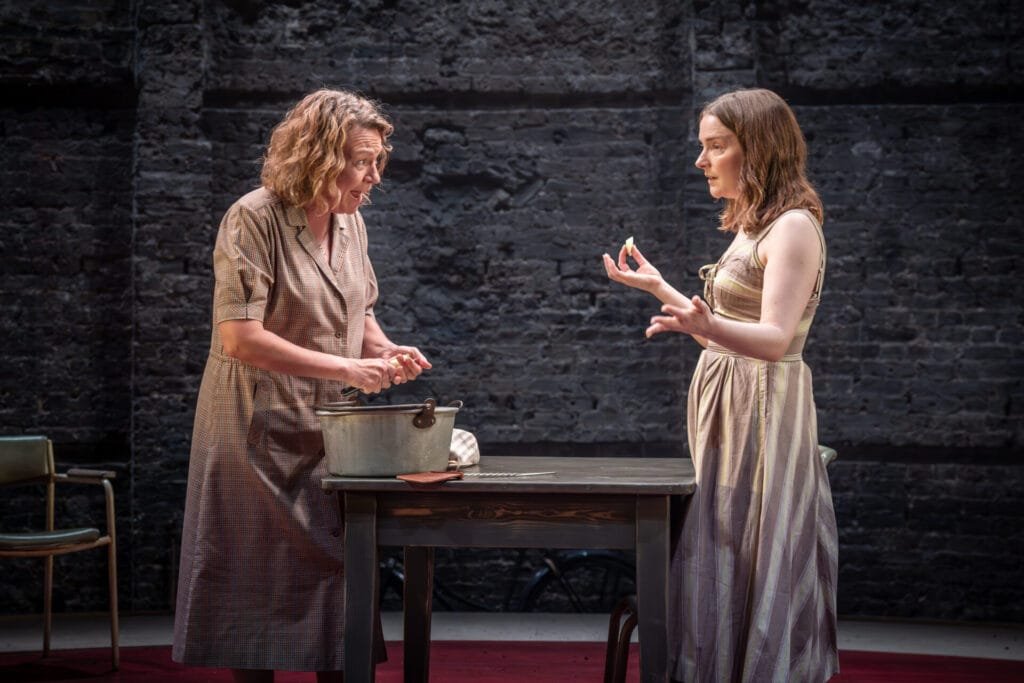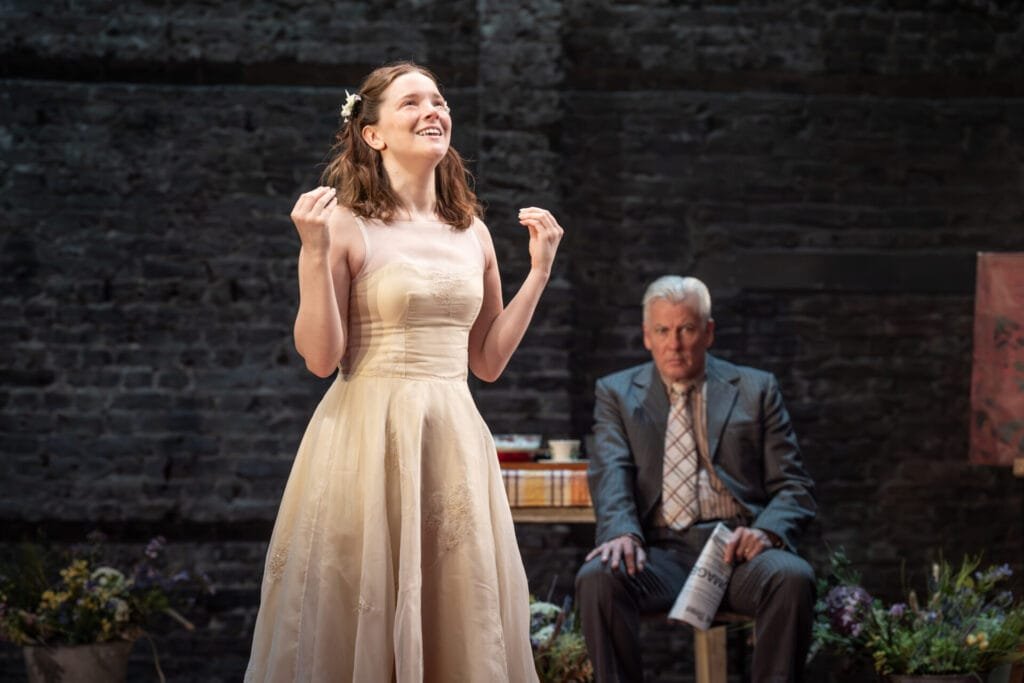Women's Liberation 1958 Style
“We shut off our minds the minute anything unfamiliar appeared.”
Beatie Bryant

Roots is the second play in Arnold Wesker’s trilogy. The first play Chicken Soup with Barley was roughly about Arnold Wesker’s mother and his East End London home. Roots is loosely based on Arnold’s wife, Lady Dusty Wesker’s home life in Norfolk. She was nicknamed Dusty because according to her suitor Arnold Wesker, her hair was curly and golden, “like gold dust.” Morfydd Clark plays Beatie, the youngest daughter of the Bryant family, who captures the spirit of this working class girl brought up in a cultural desert but who learns to grapple with political ideas, classical music and literature.
The first act is set in the home of Beatie’s elder sister, Jenny (Eliot Salt) and brother in law Jimmy (Michael Abubakar)’s home as Beatie pays a visit to them for two days before going on to see her parents. This sets the scene as Beatie is full of her boyfriend Ronnie’s ideas and many of her sentences start with “Ronnie says . . .” or “Ronnie thinks . . .” Beatie shows her hard working nature as she tidies and organises Jenny’s house while they introduce their family.

We hear what a skinflint their father is as they discuss the meagre amount of housekeeping he allows their mother. We also meet Stan Mann (Tony Turner) a likeable elderly neighbour, who flirts outrageously with the younger women.
In Act Two, we switch to Beatie’s family home. Beatie takes her mother to task for her conversation based on local events, about who is ill or has died or the mundane, like, “There goes the 1.30 bus to Diss”. Beatie has been taught by Ronnie to appreciate classical music and tries to introduce her mother to more than sentimental popular love songs. When she tries to bake a cake for her sister, her father (Deka Walmsley) forbids the use of his electricity. We are shocked by his miserly behaviour although he may also have to be careful because he earns very little as a farm labourer. But we can laugh as he later deliberately turns off the standard lamp plunging everyone into near darkness.

Some of Arnold Wesker’s play made me feel uncomfortable as he appears to be condemning the lack of ambition of the rural Norfolk labouring classes. Even Beatie’s conversations telling her mother what to say, and not to say, in front of Ronnie made me feel that she undervalued her own family in relation to Ronnie’s family. Knowing the real Dusty, I find this hard to believe, unless of course if it were Arnold telling her what to do and the folly of youth and first love or indeed the playwright’s artistic licence.
The final act sees the whole family wearing their Sunday Best, the table laid with trifle and culinary treats, gathered to welcome Ronnie. As well as Jimmy and Jenny, their brother Frank (Billy Howle) is there with his wife Pearl (Ellora Torchia). We see Frank is not earning his living from the land. There is much to amuse in all three acts but this third act feels the most powerful as it sees the culmination of Beatie’s confidence as she starts to find her own voice through an impassioned speech about working class culture and its inadequacy to create a climate of change.
Diyan Zora makes a good job of directing this 1958 play but I shall always remember Arnold Wesker for his resentment at not being as famous as Harold Pinter.

Production Notes
Roots
Written by Arnold Wesker
Directed by Diyan Zora
Cast
Starring:
Morfydd Clark
Billy Howle
Eliot Salt
Ellora Torchia
Michael Abubakar
Sophie Stanton
Iwan Davies
Tony Turner
Deka Walmsley
Creatives
Director: Katy Rudd
Set Designer: Naomi Dawson
Costume Designer: Tomás Palmer
Movement Director: Chris Evans
Lighting Designer: Lee Curran
Fight Director: Yarit Dor
Information
Running Time: One hour 45 minutes without an interval
Extended and Booking to 30thNovember 2024
Theatre:
Almeida Theatre
Almeida Street
London N1 1TA
Phone: 020 7359 4404
Website: almeida.co.uk
Tube: The Angel
Reviewed by Lizzie Loveridge
at the Almeida
on 5th October 2024

